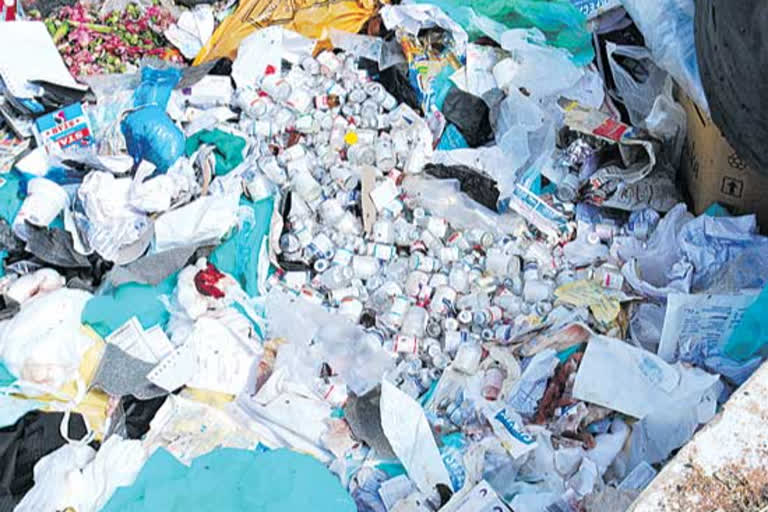Hyderabad (Telangana): With the continuing surge in COVID-19 cases across the country, there is a significant rise in the number of people being admitted to public and private hospitals. Consequently, biomedical waste accumulated across hospitals, testing and diagnostic centres, laboratories and clinics are proving to be a serious public health hazard. Since the pandemic is claiming countless lives, safe disposal of medical waste assumes serious importance.
Dumped healthcare waste exposes healthcare workers, waste handlers and people to toxic effects. Management of used bandages, syringes, surgical cotton and other medical waste is becoming a challenge to hospitals and the government. In the wake of COVID-19, the issue has taken a turn for the worse. Post testing disposed of PPE kits, gloves and masks are getting accumulated everywhere. Hospitals and medical faculties are hardly focused on effective disposal.
According to the Central Pollution Control Board (CPCB), India produced about 616 tons of biomedical waste per day in 2019. Assocham and Velocity surveys revealed that the number would shoot up to 776 tons by 2022. The CPCB estimated that the country is generating 146 tons of medical waste a day only from the testing, treatment and quarantine of COVID-19 treatments. Ignoring this massive pile of hazardous waste would prove dangerous.
The CPCB report said that the waste treatment and disposal facilities were few and far between compared to the amount of generated waste. Recognizing the gravity of the situation, the National Green Tribunal has also directed the authorities to take measures for the proper management of biomedical waste. The Government of India made amendments to the Bio-Medical Waste Management Rules in 2016. They stipulate that biomedical waste must be scientifically disposed of through segregation, collection and treatment in an environmentally sound manner to minimize the impact on health workers and the environment.
READ: Guidelines issued for Covid vaccination waste
Biomedical waste management requires approval from State Pollution Control Boards (SPCB). Biomedical waste is classified into 46 types. Yellow, red, white and blue colour-coded bins must be set up in all hospitals for medical waste. Laboratory and microbial wastes, blood samples and bags should be disinfected in the manner prescribed by the World Health Organization and the National AIDS Control Organization. More stringent standards have been introduced to reduce the emission of pollutants into the environment. A barcode system should be set up for waste disposal bags and containers.
Gloves, masks and PPE kits used in residential and commercial settings must be isolated for 72 hours before shredding and disposal. Containers, bins and trolleys used to hold waste must be cleaned with sodium hypochlorite solution. All the SPCBs are required to implement the regulations issued by CPCB. Self-regulatory mechanisms for waste segregation and management should be promoted. Appropriate funding through National Rural Health Mission will go a long way. People should also adopt waste management as a social responsibility.
The government must undertake large-scale awareness programs for the safe management of household waste. Sanitation and healthcare workers should be provided with appropriate equipment and training to handle the enormous biomedical wastes. This requires cooperation on the part of voluntary and non-government organizations. Other long-term avenues such as strengthening village and urban local bodies and continuous inspection of waste management procedures must be considered. Only then effective waste management can become a reality. It would be possible only through adequate staffing, fund allocation and coordination between various departments of the government.
READ: Nearly 160 tonnes of biomedical waste generated during Bihar polls



